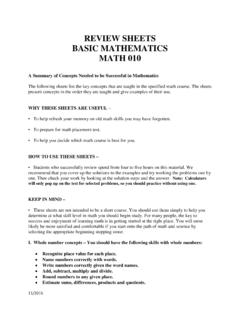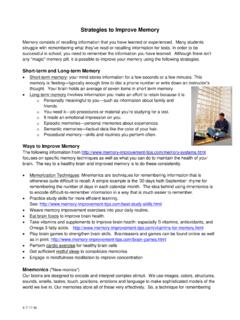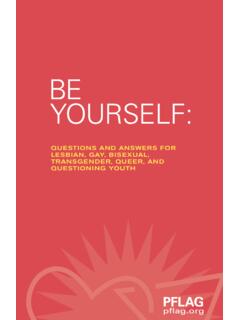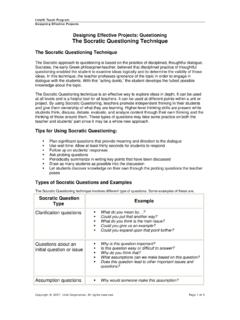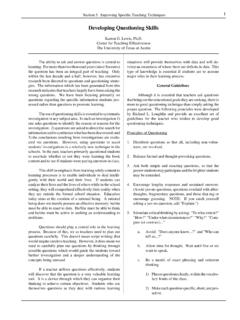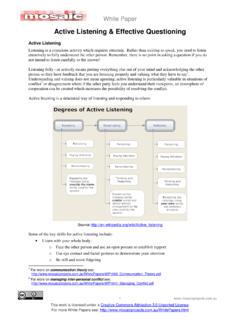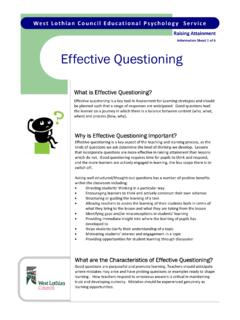Transcription of Using classroom questioning effectively
1 This handout is designed to help you enhance learning though the use of questioning . It will assist your ability to: state the educational value of asking questions in your class select appropriate types of questions for particular teaching situations design a sequence of questions to deepen learning on a particular topic ask questions that help learners learn to think like a professional ask questions that help learners become better learners manage question and answer exchanges to encourage participationUsing classroom Questions EffectivelyBCIT LEARNING AND TEACHING CENTRE3700 Willingdon Avenue, Burnaby, BC, V5G 3H2 Telephone: (604) 432-8927 Fax: (604) 431-7267 Web site: classroom Questions effectively Instructional Job AidWhy bother asking questions?The process of learning involves the brains of the learners.
2 What we know about brains and learning is that the more interconnections between parts of the brain associated with a particular learning, the stronger the learning. Asking good questions enables learners to work with the knowledge Using different functional parts of their brain, thereby strengthening their for asking students questions To get learners thinking To motivate learners To improve the lesson effectiveness To foster rapport between instructor and learner To enhance learning through communication among learners To assess prior knowledge To assess learning To assess teaching effectiveness To guide learners having difficulties back to the task. To encourage personal connections to the Job Aid Using classroom Questions EffectivelyTiming of questionsThe answer to When should we ask questions?
3 Is anytime, as long as they are consistent with our educational themes and the start of the lesson they can be used to:1. Engage learners in the topic2. Assess prior knowledge3. Recognize existing knowledge or learning to that the lesson they can be used to:1. Ensure learning has occurred at lower levels before moving to higher levelsa. Questions to assess knowledge of terminology and concepts before questions on application2. Serve as a means to focus activitya. Questions to help individuals deal with learning blocksb. Questions to enhance theory learning beyond the basic outcomes of the coursec. Questions to get learners to predict outcomesd. Questions to get learners to argue opinionsAt the end of the lesson they can be used to:1. Celebrate the learning achieved relative to the learning outcomes (build confidence)2.
4 Summarize the lesson experience3. Contextualize the learning within a wider frame of reference4. Explore the class s reaction5. Synthesize class concepts with other material6. Engage the topic at a higher throughout the lesson they can be used to:1. Help learners examine their own learning2. Help learners reflect on:a. contentb. processc. personal skillsd. the futureAs the major focus of the learning they can be used to:1. Drive the process and outcomes for the entire learning episode2. Explore problems in the context of the classroom Questions effectively Instructional Job AidTypes of questionsQuestions can be organized in a variety of ways. Some question styles are listed vs. OpenThe most common question style relates to the learner response. If the correct answer is in the question, or there is only one correct answer, or the learner only has to agree or disagree, then it is usually considered a closed question.
5 Example: The common rafter requires only 4 saw cuts. Agree or disagree?Closed questions can be used to review or establish a : What is the reason the suspension is created first? What is the first step in the process? What is the next step? more favoured approach is to use a question that requires learners to generate an answer of their own. This style is referred to as an open : What saw cuts are required to make a common rafter?Convergent vs. DivergentThe Convergent question restricts the responses to predetermined : According to the author, what are the possible reasons that .. ? What are the factors controlling the speed of a motor?The Divergent question allows a multitude of correct responses. This style is an excellent choice for situations where learners are being required to be creative or look for alternatives beyond their : What other factors should the analysis have considered?
6 What are the possible responses to her complaint?Instructional Job Aid Using classroom Questions EffectivelySimple vs. DifficultThe simple question requires simple recall or restatement of given : What are the four Ps of marketing? State the three components of difficult question is used at the application level of learning, which is usually where college level courses are : In the example of Whithers and Associates, which of the four Ps was the most inadequately addressed in their stethoscope campaign? If a resonant circuit has the capacitor replaced with one of double the capacity, what will happen to the impedance?The higher level question is used for the mastery of various concepts. It is used to stimulate a higher level of thinking, for example, to evaluate, make predictions, argue, and draw inferences, Examples: How was the stethoscope campaign affected by the change in corporate leader-ship?
7 What might have alleviated the impact of this transition? How does the variable capacitor influence the tuning of a radio? Using classroom Questions effectively Instructional Job AidOther types of questionsHypotheticalHypothetical questions are useful for forcing learners to move beyond what has been dealt with into the anticipated, and even unanticipated, area of what ifs. Examples: Given what we know about what happened, what do you predict would have hap-pened if there had been a mid-course correction of the stethoscope campaign with a doubling of the advertising budget for trade journals? What would happen if the capacitor in the circuit shorted out?ReflectiveReflective questions require learners to look back with a future perspective. They can be used to focus on both the application of the content and the process used to learn or solve : Based on what you learned about the process, what caution would you keep in mind the next time you approach a similar situation?
8 If you had the problem to do over again, what would you do differently? What would you have liked to have known before starting on the project?PredicativePredicative questions ask learners to declare what they feel will happen. The technique can be made stronger by asking learners to commit to their answers by writing them down or by saying them aloud, to a partner, a group, or the whole : Based on what you know now, what do you think is likely to happen when .. ? At this point in the procedure water enters the system. What will happen with respect to the time for the procedure to be completed?Organization and valuingOrganization and valuing questions ask learners to:1. Contrast (How are X and Y different?)2. Compare (What are the similarities and differences between X and Y?)3. Order (What is the appropriate sequence of operations that should be used in.)
9 Situation?)4. Prioritize (Which of these two steps is important to do first?)5. Cluster (Which of these belong together?)6. Label (What would be an appropriate name for this group of activities?)7. Hypothesize (Based on what happened, what would you infer about .. ?)8. Predict (If the process runs for another X months, what do you anticipate will occur?)9. Value (What is important about .. are important aspects of .. ?)Instructional Job Aid Using classroom Questions EffectivelyClarifyingClarifying questions are used to make the content more specific or clearer. They are often used as follow up questions, and can vary in tone from warm and encouraging to direct and : Can you tell me a bit more about .. ? What were the limitations on their data set? How would you describe .. to a 12 year old ( , to client with no background in the subject)?
10 Elaborating Elaborating questions can be used to engage the learners by allowing them to expand the concept beyond what has been given. Example: What would you add to the comments on the study to expand or generalize the ideas to other settings?SummarizingSummarizing questions are often useful at the end of a lesson or section. Rather than the instructor summarizing, the idea is to get the learners to pull together the concepts and cull the experience to the most important elements. This approach requires a higher order of thinking by the learners because of the necessary judgement they are required to do. As well, it can be used as an ending group : Based on your experience what are the most important elements in the process? With respect to the replacement of a xxx, what are the key cautions for the person doing the Socratic questioning is a fairly intensive questioning methodology, in which the instructor feigns ignorance and entices understanding out of the learner(s).

